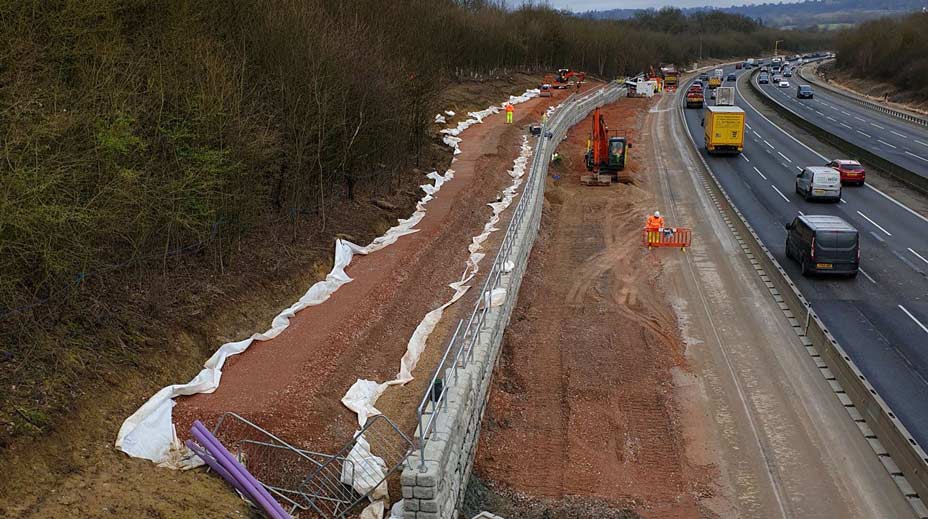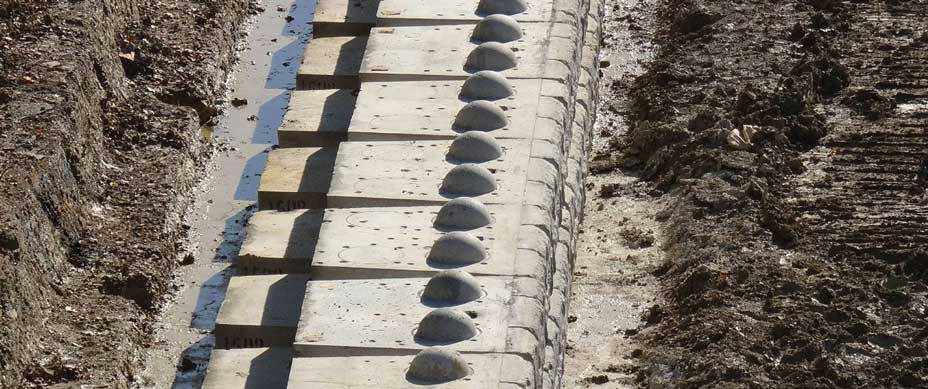Two Highway Projects Save £16 million Using Redi-Rock Retaining Walls
2.9 kilometers (1.8 miles) of retaining walls help upgrade 27.5 kilometers (17 miles) of Highways England road network to Smart Motorways
Redi-Rock was approved by the United Kingdom's Highway Authorities Product Approval Scheme (HAPAS) in 2018. Before it made its debut in the Highways England network, however, the proprietary precast modular block system underwent further review by contractor Kier Highways in collaboration with engineer Jacobs Atkins Joint Venture. The diligence paid off in the form of £16 million in verified efficiencies for the 2.9 kilometers (1.8 miles) of Redi-Rock retaining walls utilized in upgrading two sections of roadway to smart motorways.

PROBLEM: IN SEARCH OF AN INNOVATIVE RETAINING WALL SOLUTION
As part of the smart motorways upgrades for M20, J3-5, and M23, J8-10, the verge needed to be widened to accommodate extra lanes, emergency areas, and gantry bases. With varied terrain and demands along the 27.5 kilometers (17 miles) of roadway, Kier Highways started searching early on in the planning process for an innovative retaining wall solution to avoid land acquisition for the upgrades.
Kier partnered with project designer Jacobs Atkins Joint Venture to conduct efficiency assessments of various retaining wall solutions. Their assessment included analyzing the structural and geotechnical capability of solutions for walls under 1.5 meters (5 feet) and up to 3.5 meters (11.5 feet) tall, as well as conducting a cost comparison.
Potential wall systems examined for the project included:
- Cantilever walls
- Sheet piles driven from temporary platforms
- Sheet piles driven from road level with lane closure
- Contiguous bored pile walls
- Gravity walls constructed from precast modular blocks (PMB)
- Gravity walls constructed from gabions
Gravity walls built from PMBs, specifically Redi-Rock blocks from Somerset-based manufacturer Marshalls CPM, rose to the top of the solutions after their analysis.

SOLUTION: GRAVITY WALL WITH REDI-ROCK PRECAST MODULAR BLOCKS
Redi-Rock gravity walls rely on the sheer mass of the concrete blocks, as well as the patented dome and groove interlocking technology, to withstand the pressure of the retained earth. With an extensive library of blocks ranging in weight from 530-2190 kilograms (1160-4840 pounds) and in width from 710-2440 millimeters (28-96 inches), gravity walls over 6 meters (20 feet) tall can be built.
Compared to the other options analyzed, Redi-Rock offered:
Lower Cost: Considerably less expensive versus cast-in-situ alternatives that require multi-phase construction and costly formwork, as well as the ability to eliminate additional land purchases and lessen excavation by being constructed in a tight footprint. Superior Quality: off-site prefabrication in a controlled environment improves the quality of the end result, and Redi-Rock blocks offer the texture of natural stone for enhanced aesthetics of the finished wall. Environmentally Friendly: fabricated with 25% recycled materials, as well as eliminating the waste of onsite formwork and reducing excavation that disrupts habitat, Redi-Rock blocks are CE marked for safety and performance with a design life of 120 years. Installation Efficiencies: Kier's own crew could install the gravity walls without special equipment at a rate of 75 square meters (800 square feet) per day because the blocks are non-grouted and dry-stacked, which reduced onsite work time and improved safety alongside live motorways.
For the Highways England project, Marshalls CPM worked in collaboration with stakeholders to create a custom solution to further expedite installation through offsite construction and enhance the quality of the end result. The customization included modifying the top block for walls over 1.5 meters (5 feet) to include a socket for guardrails that would allow safe access for inspections and maintenance. The guardrails were installed under factory-controlled quality systems, providing additional time savings on site.
OUTCOME: REDI-ROCK SAVES £16 MILLION AND CONTRACTOR WINS AWARD
The 2.9 kilometers (1.8 miles) of retaining walls were finished in the Cobblestone texture in 2020. With the appearance of six smaller blocks on the face of each Redi-Rock block, the walls provide an attractive, less industrial roadside feature along two sections of England's busiest roadways.
Upon completion, the Highways England Efficiency Register - where initiatives that save time or money are recorded, evaluated, and verified by an independent party - showed that the use of Redi-Rock delivered project efficiencies over £16 million. At 5.6% of the total project budget for the smart motorway upgrades, the client Highways England was very pleased with the result.
For their work on the project, Kier was nominated for a 2020 Constructing Excellence SECBE Award in the Civils Project category and went on to win the award in the Health and Safety category.
To learn more about how the Redi-Rock system, which also includes the Positive Connection blocks for mechanically stabilized earth walls, might help you on your next project, download the international Design Resource Manual.
PROJECT DETAILS
Project: Highways England #219 Customer: Highways England Engineer: Jacobs Atkins Joint Venture Manufacturer: Marshall's CPM Installer: Kier Highways Location: United Kingdom Year Built: 2020
PRODUCTS FEATURED IN THIS CASE STUDY:
Gravity Retaining Wall Blocks - Massive, one-ton Redi-Rock gravity blocks rely on the sheer mass of each block to hold back the earth.
Cobblestone Texture - Redi-Rock Cobblestone blocks feature a great stacked stone aesthetic with the appearance of six smaller blocks.